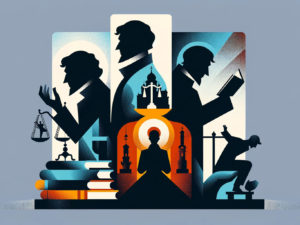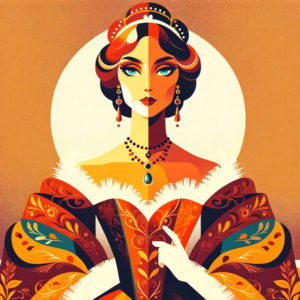Summary of “The Brothers Karamazov” by Fyodor Dostoevsky, a Russian novelist renowned around the globe. It stands as his final novel, published in 1880. The narrative delves into moral debates involving God, free will, and ethics, told through the interactions of the Karamazov family. The book’s central concern revolves around the existential struggles of faith, doubt, and reason.
Short Summary of The Novel
 “The Brothers Karamazov” revolves around the tumultuous lives of the Karamazov family. The patriarch, Fyodor Pavlovich, is a wealthy, depraved man with little interest in fathering his three sons, Dmitry, Ivan, and Alyosha. Dmitry, the eldest, is embroiled in a bitter dispute with his father over his inheritance and is also in love with Grushenka, whom his father also pursues. Ivan, the middle son, is an intellectual who grapples with issues of faith and rationalism. The youngest, Alyosha, is a deeply religious man training to become a monk under the guidance of the elder Zosima.
“The Brothers Karamazov” revolves around the tumultuous lives of the Karamazov family. The patriarch, Fyodor Pavlovich, is a wealthy, depraved man with little interest in fathering his three sons, Dmitry, Ivan, and Alyosha. Dmitry, the eldest, is embroiled in a bitter dispute with his father over his inheritance and is also in love with Grushenka, whom his father also pursues. Ivan, the middle son, is an intellectual who grapples with issues of faith and rationalism. The youngest, Alyosha, is a deeply religious man training to become a monk under the guidance of the elder Zosima.
The plot thickens when Fyodor Pavlovich is murdered. The suspicion immediately falls on Dmitry, who has both a financial motive and a passionate temperament. As the investigation unfolds, the novel explores themes of morality, the existence of God, and the nature of free will. Each brother embodies different aspects of belief and skepticism, and their personal dramas reflect the broader philosophical questions at the heart of the novel.
Dostoevsky uses the characters’ inner struggles and the family’s drama to pose deep philosophical and theological questions, making the novel a masterpiece that probes the darkest depths of the human soul and the possibility of redemption.
Plot Summary of “The Brothers Karamazov”
Part One: A Murderous Heritage
Part One introduces the Karamazov family with a focus on the father, Fyodor, and his sons, Dmitry, Ivan, and Alyosha. The animosity between Dmitry and Fyodor becomes evident, rooted in a dispute over Dmitry’s inheritance and their mutual infatuation with Grushenka. The intellectual Ivan is presented with his existential dilemmas, while Alyosha is portrayed as a spiritual seeker under the mentorship of Father Zosima.
Part Two: The Ideological Divide
This part delves deeper into the ideological and emotional conflicts. Dmitry’s desperation for money intensifies as his debts grow, and his rivalry with his father over Grushenka leads to threats of violence. Ivan’s philosophical conversations reveal his inner turmoil about God and morality, while Alyosha’s faith is tested by the moral failings he observes around him.
Part Three: The Murder
The tensions reach a peak when Fyodor Pavlovich is found dead. Dmitry, who had been seen in a frenzied state earlier, quickly becomes the prime suspect. The evidence against him mounts, including a damning testimony from the servant Grigory. Despite his protests of innocence, Dmitry is arrested and imprisoned, while Ivan and Alyosha struggle with the implications of their father’s death.
Part Four: The Trial
In the courtroom, the drama unfolds with the brothers’ fates hanging in the balance. Ivan grapples with his conscience and confesses to a psychological breakdown, revealing conversations with the devil where he confronts his own philosophical doubts. Alyosha remains a moral compass, supporting his brother Dmitry and attempting to find a resolution that aligns with his spiritual beliefs. The trial concludes with Dmitry being found guilty, though the novel suggests he may be innocent.
Epilogue: Resolutions and New Beginnings
The Epilogue offers closure to some of the storylines while leaving others open-ended. Dmitry plans an escape to America with Grushenka, while Ivan’s health deteriorates. Alyosha continues to embody the ideals of Father Zosima, urging the young boys he befriends to live moral lives, hinting at a future where the principles of love and faith persist beyond the novel’s pages.
Main Characters Overview
These characters are at the heart of the complex narrative and moral quandaries that drive “The Brothers Karamazov”. Each representing different philosophical and ethical viewpoints that Dostoevsky explores throughout the novel.
Fyodor Pavlovich Karamazov
The father of the Karamazov brothers, Fyodor is a lecherous, crude, and often despicable character. He lacks any moral compass and is primarily driven by greed and lust.
Dmitry Karamazov (Mitya)
The eldest brother, Dmitry is passionate and impulsive. He has a tumultuous relationship with his father, largely due to disputes over his inheritance and their mutual affection for the same woman, Grushenka.
Ivan Karamazov
The middle brother, Ivan is intellectual, philosophical, and struggles with religious and ethical issues. He grapples with the problem of evil and questions the justice of God.
Alexei Karamazov (Alyosha)
The youngest brother, Alyosha is kind, devout, and the most spiritually inclined. He is a novice monk under the mentorship of Father Zosima and often acts as the moral compass of the family.
Smerdyakov
The illegitimate son of Fyodor Pavlovich and a mute cook, Smerdyakov works as Fyodor’s lackey. He is depicted as cunning and resentful, with a deep-seated bitterness towards his status and the Karamazov family.
Grushenka (Agrafena Alexandrovna Svetlova)
The woman both Fyodor Pavlovich and Dmitry are infatuated with, Grushenka has a powerful influence on the Karamazov men. She is capricious and seductive, but also reveals depth and complexity in her interactions.
Katerina Ivanovna Verkhovtseva (Katya)
Dmitry’s fiancée, Katerina is a proud and noble woman who becomes entangled in the family’s conflicts. Her relationship with Dmitry is complicated by her feelings for Ivan.
Father Zosima
The spiritual elder and mentor to Alyosha, Father Zosima is a wise and compassionate figure whose teachings influence many characters in the novel. His death prompts a crisis of faith for Alyosha.
Interesting Facts About The Novel
- Author’s Magnum Opus: Often considered Dostoevsky’s masterpiece, “The Brothers Karamazov” was his last novel, completed shortly before his death.
- Philosophical Depth: The novel delves into deep philosophical questions concerning God, free will, and morality, influencing later philosophical thought.
- Literary Influence: The book has significantly impacted literature, with writers like James Joyce, Virginia Woolf, and Franz Kafka citing its influence on their work.
- Psychology and Religion: Dostoevsky explores psychological realism and religious philosophy, particularly through the characters of Ivan and Alyosha.
- The Grand Inquisitor: One of the most famous chapters in literature, this section is a poem narrated by Ivan, discussing Jesus’s return during the Spanish Inquisition.
- Real-Life Inspiration: The plot was partly inspired by a real criminal case that Dostoevsky covered during his work at a magazine.
- Freud’s Analysis: Sigmund Freud wrote an extensive psychoanalytic study of the novel, focusing on the parricide.
- Complex Narration: The narrative voice is complex, combining a third-person omniscient narrator with the voices of the characters themselves.
- Political Prophecy: The novel anticipated the rise of totalitarianism in Russia and the potential dangers of atheistic socialism.
- Cultural Impact: It has inspired operas, films, and stage adaptations, underscoring its lasting cultural significance.
- Delayed Completion: Dostoevsky took nearly two years to complete the book, often struggling with its complex themes and his own health issues.
- Academic Study: The novel is a staple in courses on literature, philosophy, and Russian culture, and has been the subject of extensive academic research and analysis.
- Socratic Dialogues: Dostoevsky structures some of the conversations in the novel after the style of Plato’s dialogues, with characters representing different aspects of philosophical debate.
Frequently Asked Questions About “The Brothers Karamazov”
Who is the protagonist of “The Brothers Karamazov”?
The novel does not have a single protagonist. Instead, it centers around the three Karamazov brothers – Dmitry, Ivan, and Alyosha – each representing different aspects of humanity and philosophical thought. Their father, Fyodor Pavlovich, also plays a central role in the narrative.
What are the main themes of “The Brothers Karamazov”?
The main themes include faith versus doubt, the nature of free will, the existence of God, the problem of evil, the search for redemption, and the struggle between spiritualism and materialism.
How does Dostoevsky approach the topic of God and religion in the novel?
Dostoevsky explores the topic of God and religion through his characters, particularly Ivan and Alyosha. Ivan represents skepticism and intellectualism, often questioning the justice of God, while Alyosha embodies faith and spirituality. Through their interactions and conflicts, the novel probes deep theological and existential questions.
Is “The Brothers Karamazov” a detective story?
While not a detective story in the traditional sense, the novel does include a murder mystery that drives the plot. The investigation of Fyodor Pavlovich’s murder and the subsequent trial of Dmitry provide a framework for exploring the novel’s deeper philosophical questions.
Does the novel have a clear resolution?
The novel ends without a neat resolution. Dmitry is convicted, but doubts about his guilt remain. Ivan is left in a state of mental anguish, and Alyosha continues his spiritual journey. The open-ended conclusion prompts readers to ponder the complex themes presented in the novel.
How does “The Brothers Karamazov” reflect Russian society at the time?
The novel reflects Russian society in the 19th century, dealing with issues such as the class system, the role of the Orthodox Church, and the rise of socialist and nihilist thought among the younger generation. It captures the cultural and ideological shifts of Dostoevsky’s Russia.
What is the significance of the character Father Zosima in the novel?
Father Zosima is a spiritual elder and mentor to Alyosha, representing the embodiment of faith, forgiveness, and compassion in the novel. His teachings and worldview contrast with the more cynical and critical perspectives of other characters, offering a vision of hope and spiritual depth.
My Thoughts About The Novel
“The Brothers Karamazov” is an overrated behemoth, a relic of verbose and tedious literature masquerading as philosophical depth. Dostoevsky’s sprawling narrative drowns in its own complexity, burying any potential insights under endless dialogue and exasperating detail. It’s a testament to literary masochism, where readers are expected to wade through a swamp of words for only a glimmer of enlightenment. The novel’s acclaim seems more a feat of endurance than of genuine literary merit, rewarding those who can claim to have trudged through its morass as if wading through quicksand qualifies as a profound experience.
Dostoevsky’s “The Brothers Karamazov”: literary Everest or pretentious pile of paper? 🏔️🗑️ Are you an awestruck admirer or a skeptic with a smirk? 🧐😏 Drop your verdict in the comments!


Comments